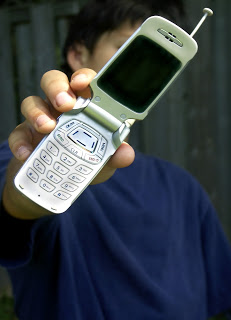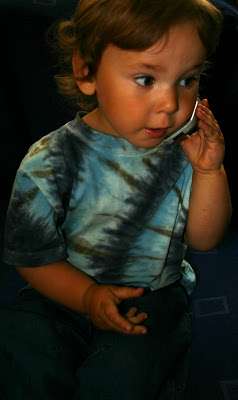 In the first year or so that my daughter, the Lovely K., was with me, she found phone conversations and leaving messages very challenging. She was eight, and had not had very much experience with phones in Ethiopia, if any. In many parts of the world, cell phones have leap-frogged right over land lines in places that never had phone service at all, but even so, not everybody can afford it. It is not unusual for just one person in an extended family or neighborhood to have a phone, and pass along messages and loan the phone as required.
In the first year or so that my daughter, the Lovely K., was with me, she found phone conversations and leaving messages very challenging. She was eight, and had not had very much experience with phones in Ethiopia, if any. In many parts of the world, cell phones have leap-frogged right over land lines in places that never had phone service at all, but even so, not everybody can afford it. It is not unusual for just one person in an extended family or neighborhood to have a phone, and pass along messages and loan the phone as required.But I digress. For many people, phones seem to be surgically attached, and it can be hard to bear in mind that talking on the phone is a skill we actually have to learn. In my childhood it was much simpler. We didn’t have answering machines, let alone cell phones. We had a weekly phone call with grandma, which accustomed me to speaking and listening to someone I couldn’t see, and therefore whose visual cues couldn’t help me follow the conversation. If we called a friend and nobody was home, the line would just ring and ring and ring, and we would try again later, or if the line was in use we got the busy signal, something that seems to be a relic of the past now. I know, I know, “In my day…” is just about the most boring and curmudgeonly way to begin an argument!
Now, however, if you make a phone call you will almost certainly reach either a person or voice mail, and either way, you’re expected to say something coherent, meaningful, and concise on cue. The anxiety and consternation that this caused for K. was a surprise to me. Talking on the phone and leaving messages is so much part of daily life that it was an eye-opener that she didn’t know how and was apprehensive to boot; but of course, she was having to do this in a new language, and it’s likely that the pressure of the “BEEP” drove her new English words right out of her head. Early on, when K. summoned the nerve to phone a friend herself, she would panic if the call went to voice mail; she would either hang up or thrust the phone into my hands whispering urgently, “You say it!” She was lacking in social courage, not surprisingly!
So the courage challenge became mastering phone etiquette. We would rehearse what she should say if she wanted to initiate a play date by phone.
Me: “If her mom answers the phone, you say, ‘Hi, this is K. May I please speak to B.?’ Okay, now you try it.”
K.: “Okay. ‘Hi can I speak to –‘ Wait, what do I say? I mixed up.”
Me: “And if you get the answering machine, say your full name, what day you are calling, and ask if B. can come for a play date on Thursday. Then you say good-bye. And thank you, if you can remember.”
The rehearsal always took longer than the phone call itself, and sometimes it all went out the window when the phone call actually went through and the pressure was on. Generally once the girls had agreed that of course they wanted to have a play date together, they would each hand off the phones to us, the moms, to work out logistics. Often K. would ask if I could just do the whole thing and relieve her of the anxiety it produced. But gradually the rehearsals got faster and less necessary, and the girls were able to at least start sorting out logistics, and K. remembered on her own to identify herself in messages, and say please and thank you without my whispered coaching from nearby.
Now, at 12, there is more telephone use for sure, especially as several of K.’s friends already have cell phones of their own. Two of her friends have divorced parents and move back and forth across town during the week, so tracking down one of these friends can involve calling both a mom and a dad on at least two different phone numbers each. That’s a lot of practice leaving messages!
Recently, I overheard K. leaving a message for B., who had been sick for a few days. “Hi, this is K., calling on Saturday around twelve-thirty. I just called to say I hope you are feeling better, and I hope I see you soon. Bye.” That suggests to me that we have taken care of this source of anxiety, and are ready to put that fear behind us.
I know many children have listened to one-sided phone conversations from birth, and I have heard many a toddler mimic phone calls on toy cell phones very convincingly from their car seats – greetings, pauses, murmurs of assent, questions, pauses, setting plans, sharing news, friendly laughter and saying good bye. Perhaps the ubiquity of phones in our lives is making “fear of phoning” a thing of the past. For K., who spent her first eight years under very different circumstances from most American kids, using the phone turned out to be an unexpected challenge.
I sometimes wonder if the hardest courage challenges will always be the unexpected ones. If that’s true, then the only way I can prepare my daughter to face them will be to remember I must encourage her in something every day, no matter what, but something meaningful. “You did a good job with those dishes,” “I’m impressed by how hard you worked on that assignment today,” “Good luck on the spelling test,” or even the reaching-for-straws “Thanks for remembering to hang up your coat,” may be as thoughtful as it gets on a busy day.
And maybe that message will be enough.

